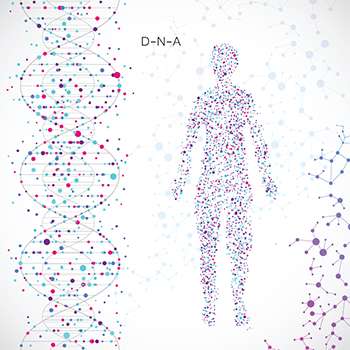Cancer Genetics
Hereditary Cancer Syndromes
Find your care
Learn about your inherited risks so you can make informed decisions about your health care. For more information, connect with a cancer care specialist at 310-825-5287.
The following list is not exhaustive, but includes the most common indications.
- Hereditary Breast and Ovarian Cancer (HBOC)
- Hereditary breast and ovarian cancer syndrome is an inherited condition that increases the risk of developing breast cancer and ovarian cancer. In addition, some families with HBOC have higher rates of pancreatic cancer, prostate cancer, melanoma, and other cancers. HBOC is associated with inherited harmful changes in the BRCA1 and BRCA2 genes, as well as several other genes including ATM, BARD1, BRIP1, CHEK2, NBN, PALB2, RAD50, RAD51C, and RAD51D.
- Lynch Syndrome

- Lynch Syndrome is an inherited condition that is associated with an increased risk for several types of cancers. These include cancers of the colon, uterus, ovary, stomach, small intestine, urinary tract/bladder/kidney, bile duct, pancreas, sebaceous gland, and brain cancer (usually glioblastoma). Lynch Syndrome is linked to inherited harmful changes in the MLH1, MSH2, MSH6, PMS2 and EPCAM genes. Lynch syndrome is sometimes called hereditary nonpolyposis colorectal cancer syndrome (HNPCC).
- Familial Adenomatous Polyposis (FAP)
- Familial adenomatous polyposis is an inherited condition in which individuals may develop hundreds to thousands of precancerous growths in the colon, called adenomatous polyps. They also have a higher risk for cancers, including stomach, small bowel, pancreas, bile duct, liver, thyroid, and brain (usually medulloblastoma). Some people with FAP have benign growths called desmoid tumors and a benign eye condition called congenital hyperpigmentation of the retinal pigment epithelium (CHRPE). FAP is due to inherited harmful changes in the APC gene.
- MUTYH-Associated Polyposis (MAP)
- MUTYH-associated polyposis is an inherited condition in which individuals may develop a few, or hundreds to thousands of precancerous growths in the colon, called adenomatous polyps. People with MAP are also at an increased risk to have colon, small bowel, and thyroid cancer, and possibly other cancers. MUTYH-associated polyposis is caused by inheriting two copies of the MUTYH with harmful changes, one from each parent.
- Li-Fraumeni Syndrome (LFS)
- Li-Fraumeni syndrome is a rare condition that is associated with an increased risk for many kinds of cancer such as early onset breast cancer, soft tissue cancers, bone cancer, brain tumors, cancer of the adrenal gland, and leukemias. LFS is caused by inherited harmful changes in the TP53 gene.
- PTEN Hamartoma Syndrome or Cowden Syndrome
- PTEN Hamartoma Syndrome is an inherited condition that is associated with an increased risk for benign and malignant tumors or the thyroid, breast, uterus, and colon. PTEN Hamartoma Syndrome is linked to inherited harmful changes in the PTEN gene.
- Peutz-Jeghers Syndrome (PJS)
- Peutz-Jeghers syndrome is an inherited condition that is associated with an increased risk for benign tumors and cancers of the colon, stomach, pancreas, breast, and ovary. Individuals with PJS are also at increased risk for hamartomaous gastrointestinal polyps that can cause a condition called intussusception that can require surgery. Peutz-Jeghers syndrome is caused by inherited harmful changes in the STK11 gene.
- Hereditary Paraganglioma-Pheochromocytoma (PGL/PCC)
- Hereditary paraganglioma-pheochromocytoma syndrome is an inherited condition in which individuals develop benign tumors of the paraganglia, specialized cells of the nervous system. Hereditary paraganglioma-pheochromocytoma syndrome can be caused by inherited harmful changes in several genes including SDHA, SDHAF2, SDHB, SDHC, and SDHD.
- Hereditary Diffuse Gastric Cancer (HDGC)
- Hereditary diffuse gastric cancer is an inherited condition in which individuals are at an increased risk of developing diffuse gastric cancer and lobular breast cancer. Diffuse gastric cancer is a type of cancer that forms in the stomach causing thickening of the wall of the stomach (linitis plastica) that does not form a distinct mass. Hereditary diffuse gastric cancer is linked to inherited harmful changes in the CDH1 gene.
- Von Hippel-Lindau Disease (VHL)
- Von Hippel-Lindau Disease is an inherited disorder that is characterized by the abnormal growth of blood vessels. Individuals with VHL have an increased risk of developing kidney cancer and tumors in the adrenal gland called pheochromocytomas. Von Hippel-Lindau Disease is associated with inherited harmful changes in the VHL gene.
- Multiple Endocrine Neoplasia
- Multiple Endocrine Neoplasia syndromes are a group of hereditary conditions that are associated with increased risk for tumors in hormone producing glands. Type 1 can involve tumors of the parathyroid or pituitary gland as well as neuroendocrine tumors of the pancreas. Type 2 causes a form of thyroid cancer called medullary thyroid carcinoma. Inherited harmful changes in the MEN1, RET, and other genes can cause multiple endocrine neoplasia.
- Hereditary Leiomyomatosis and Renal Cell Cancer (HLRCC)
- Hereditary leiomyomatosis and renal cell cancer is an inherited condition associated with increased risk for benign skin tumors, benign tumors in the uterus, and kidney cancers. Hereditary leiomyomatosis is associated with inherited harmful changes in the FH gene.
- Birt-Hogg-Dubé Syndrome (BHD)
- Birt-Hogg-Dubé syndrome is a hereditary condition associated with benign skin tumors, lung cysts and an increased risk of both benign kidney tumors and kidney cancer. Birt-Hogg-Dubé is associated with inherited harmful changes in the FLCN gene.
- Familial Atypical Multiple Mole Melanoma Syndrome (FAMMM)
- FAMMM is considered when two or three close relatives have been diagnosed with melanoma and pancreatic cancer or a family member has been diagnosed with melanoma multiple times. Some affected individuals have 50 or more moles. FAMMM is due to inherited harmful changes in the CDKN2A gene. Familial melanoma can be linked in some families to inherited harmful changes in other genes, including CDK4 and BAP1.